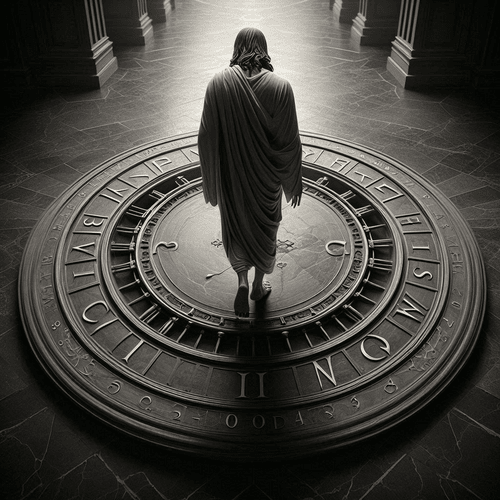Why Didn’t Jesus Know the Time of His Return? A Reformed Perspective
“But about that day or hour no one knows, not even the angels in heaven, nor the Son, but only the Father.” (Mark 13:32)
These words of Jesus have puzzled Christians for centuries. How could the eternal Son of God, the second person of the Trinity, claim ignorance about anything? For those of us committed to affirming the full deity of Christ, this verse presents an apparent theological conundrum that demands careful consideration.
Why Didn’t Jesus Know the Time of His Return? The question touches on deep mysteries of our faith: the incarnation, Christ’s two natures, and the relationship between divine and human knowledge. Through the lens of Reformed theology, we can approach this question with both intellectual rigour and humble reverence. At the same time, we recognise that while God has given us sufficient understanding, some mysteries remain beyond the pale of our comprehension.
The Two Natures of Christ: Foundation for Understanding
To understand Christ’s statement about His limited knowledge, we must first ground ourselves in the orthodox doctrine of Christ’s two natures. The Council of Chalcedon (451 AD) affirmed Jesus Christ is one person with two distinct natures—fully God and fully man—united in one person forever.
The hypostatic union means Jesus possesses both a divine nature (with all divine attributes including omniscience) and a human nature (with authentic human limitations) simultaneously. These natures are neither confused nor mixed, neither divided nor separated. As the Westminster Confession of Faith carefully articulates, the two natures are “inseparably joined together in one person, without conversion, composition, or confusion” (WCF 8.2). To Learn More, Do Check Out Our Post, Why do We Affirm Jesus is Fully God and Fully Man?
The Doctrine of Kenosis
The Apostle Paul provides crucial insight in Philippians 2:5-8, describing how Christ “emptied himself, by taking the form of a servant, being born in the likeness of men.” This self-emptying (kenosis) has been misinterpreted by some as Christ surrendering His divine attributes. However, Reformed theology understands this differently.
The kenosis refers not to Christ divesting Himself of divine attributes, but rather to His voluntary self-limitation in exercising these attributes during His earthly ministry. As Calvin notes, Christ chose to “veil His glory for a time,” not by losing or diminishing His divine nature, but by choosing not to fully exercise it as He fulfilled His mediatorial role. To Learn More, Do Read Our Post, The Kenosis: What Does It Mean that Jesus Emptied Himself?
This voluntary self-limitation wasn’t a defect but rather a demonstration of Christ’s sovereign power and love. He chose to experience genuine human limitations while retaining His full divine nature, demonstrating both His authority to lay down His privileges and His love in doing so for our sake.
Christ’s Human Nature and Limited Knowledge
In His human nature, Jesus experienced authentic human limitations. He grew in wisdom (Luke 2:52), experienced hunger (Matthew 4:2), became weary (John 4:6), and felt physical pain. These limitations weren’t imperfections but rather demonstrations of His genuine humanity.
Critically, we must understand Christ’s humanity was untainted by sin and represented humanity as God originally intended it to be. This perfect humanity still included natural human limitations—not as consequences of sin but as proper aspects of creaturehood. Just as Adam before the fall was perfectly human yet not omniscient, so Christ in His human nature was perfectly human while having limited knowledge.
Within this framework, Christ’s admission of not knowing the timing of His return reflects the proper operation of His human consciousness. His human mind, though perfect, was finite. This limitation wasn’t a flaw but rather demonstrated His complete identification with our human condition, while His divine nature simultaneously retained all divine attributes.
These limitations of Christ’s human nature operated according to His divine will and purpose. He chose to experience life primarily through His human consciousness during His earthly ministry, though His divine nature remained fully present and active according to His sovereign purpose. As Reformed theologian Herman Bavinck notes, this was not an impairment of deity but rather a demonstration of divine sovereignty in salvation.
Why Did God Choose to Limit Himself?
Why Didn’t Jesus Know the Time of His Return? The ultimate purpose behind God’s self-limitation in Christ was His determined love to save us through death. The Son of God could not die unless He became truly human, and He could not become truly human without accepting all proper human limitations—including restricted knowledge. The self-limitation wasn’t primarily about divine accommodation or providing us an example, though these are true and precious implications. Rather, it was fundamentally about qualifying Him to die as our substitute.
As the author of Hebrews tells us, “Since therefore the children share in flesh and blood, he himself likewise partook of the same things, that through death he might destroy the one who has the power of death” (Hebrews 2:14). The Son’s acceptance of human limitations, including restricted knowledge, was essential to His becoming flesh and blood—a real human being who could really die. This was no mere demonstration of empathy; it was a necessary step toward Calvary.
Of course, this central purpose produces other precious fruits. Christ’s experience does allow Him to sympathise with our weaknesses. His self-limitation does provide a profound model of humility. His accommodation to human capacity does demonstrate God’s gracious condescension. But these are the overflow, not the primary purpose, of a self-limitation that was first and foremost about securing our salvation through His death.
Conclusion: Didn’t Jesus Know the Time of His Return?
Like Calvin then, we must affirm Christ chose to “veil His glory for a time.” He did so not by losing or diminishing His divine nature, but by choosing not to fully exercise it as He fulfilled His redemptive mission. This voluntary self-limitation included accepting the bounds of human knowledge in His human consciousness, even while His divine nature retained all divine attributes. The mystery of how Christ is simultaneously both omniscient God and limited man exceeds our finite comprehension, but we affirm it nevertheless, based on Scripture’s clear testimony.
This is the heart of Reformed orthodoxy on the incarnation—we bow before the revelation of Scripture even when it transcends our understanding. We affirm both Christ’s true deity and His authentic humanity because God’s Word teaches both, even though we cannot fully explain how they cohere in the one person of our Lord. What we do know with certainty, though is this: the mysterious union of divine and human natures was undertaken for one supreme purpose—that the eternal Son might become truly human so as to die as our substitute, securing our eternal redemption through His blood. In this we rejoice, even as we worship in wonder before mysteries that exceed our grasp.
Didn’t Jesus Know the Time of His Return?—Related FAQs
Doesn’t it make Jesus less than fully God that He didn’t know the hour of His return? Not at all. Christ’s divine nature remained unchangeably divine, possessing all divine attributes including omniscience. What changed was not His divine nature but His voluntary exercise of divine attributes as He chose to operate primarily through His human consciousness during His earthly ministry.
Does Jesus know now the hour of His return? Yes, the glorified Christ now knows the timing of His return since His earthly mission is complete and the self-imposed limitations of His incarnate state are no longer necessary. After His resurrection and ascension, Christ resumed the full exercise of all His divine attributes, including His divine omniscience, while retaining His human nature in its glorified state. As Revelation 1:8 indicates, the exalted Christ is now the Alpha and Omega who declares “what is, and what was, and what is to come,” demonstrating His complete knowledge of all future events including His return.
How can the omniscient Son not know something? In His divine nature, Christ remained omniscient. However, in His human consciousness, He voluntarily accepted the limitations of human knowledge as part of His genuine human experience. This isn’t a contradiction but rather demonstrates the reality of Christ’s two distinct natures operating according to their proper attributes.
How can Christ truly sympathise with my limitations if He was still divine? Christ’s experience of human limitations was genuine, not pretended. He truly experienced what it means to walk by faith, to be weary, to be hungry, and to not know certain things. His divine nature didn’t negate these experiences but rather gave them infinite worth in accomplishing our salvation.
What comfort can I find in Christ’s limited knowledge when I face uncertainty? Christ’s willingness to accept human limitations demonstrates such limitations aren’t sinful and can be part of God’s good purpose for us. Moreover, when we face the unknown, we can trust in One who both understands our experience of limitation and possesses all knowledge in His divine nature.
How should Christ’s example shape my attitude toward my own limitations? If the eternal Son willingly accepted human limitations to accomplish our salvation, we can embrace our creaturely limitations with humility and trust. Our limitations aren’t obstacles to God’s purpose but often the very means through which He works.
Does this mean Jesus could have made mistakes or taught error? No. Christ’s limited knowledge in His human nature never resulted in error or sin because He always spoke and acted under the perfect guidance of the Holy Spirit and in perfect submission to the Father’s will. His human limitations were real but never resulted in fallibility because His human nature was sinless and perfect.
How did Christ’s divine and human consciousness relate to each other? Scripture reveals Christ possessed both divine and human consciousness but doesn’t explain precisely how they interacted. What we know with certainty is this: Christ was truly God and truly human at all times, yet He chose to operate primarily through His human consciousness during His earthly ministry. He did this while retaining undiminished access to His divine attributes, exercising them not continuously but according to the Father’s will and the needs of His redemptive mission. For instance, He displayed divine knowledge in discerning people’s thoughts or exercised divine power in His miracles.
Didn’t Jesus Know the Time of His Return?—Our Related Posts
Editor's Pick

Paul’s Mandate for Men: Headship Or Servant Leadership? Or Both?
Modern Christianity has fallen into a trap. We've created an either/or battle between "headship" and "servant leadership," as if these [...]

Should We Stop Using Male Pronouns for God? Why Do We Say No?
A friend of ours arrived eagerly at his first theology class in seminary. But he quickly discovered something troubling: the [...]

Did Old Testament Law Force Women to Marry their Rapists?
**Editor’s Note: This post is part of our series, ‘Satan’s Lies: Common Deceptions in the Church Today’… Viral misinformation abounds [...]

From Danvers To Nashville: Two Statements, One Biblical Vision
30 years separate the Danvers Statement on Biblical Manhood and Womanhood (1987) and the Nashville Statement on Human Sexuality (2017). [...]

The Nashville Statement: Why Affirm It Despite Media Backlash?
WHY DO REFORMED CHRISTIANS STAND BY THIS STATEMENT ON MARRIAGE AND GENDER? When the Nashville Statement was released in 2017, [...]

Who Is Belial? Solving The 2 Corinthians 6:15 Mystery
Belial: This name from the pages of Scripture chills the soul. Who is this mysterious figure Paul invokes in 2 [...]

Celibacy Or Castration: What Jesus Really Means in Matthew 19:12
One of Scripture's most shocking misinterpretations led theologian Origen to castrate himself in the third century. His tragic mistake? Taking [...]

Philippians 4:13: Did Paul Really Mean We Can Do ALL Things?
"I can do all things through Christ who strengthens me." It's on gym walls, graduation cards, and motivational posters everywhere. [...]

The Ordinary Means of Grace: Why Are They Indispensable?
ORDINARY MEANS FOR EXTRAORDINARY TRANSFORMATION What if God's most powerful work in believers' lives happens through the most ordinary activities? [...]

Is the Bible God’s Word? Or Does It Only Contain God’s Word?
The authority of Scripture stands at the crossroads of modern Christianity. While some argue the Bible merely contains God’s Word [...]
SUPPORT US:
Feel the Holy Spirit's gentle nudge to partner with us?
Donate Online:
Account Name: TRUTHS TO DIE FOR FOUNDATION
Account Number: 10243565459
Bank IFSC: IDFB0043391
Bank Name: IDFC FIRST BANK





